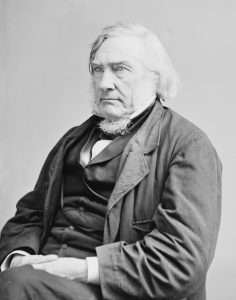The Volokh Conspiracy
Mostly law professors | Sometimes contrarian | Often libertarian | Always independent
Today in Supreme Court History: November 28, 1872
11/28/1872: Justice Samuel Nelson resigns.

Editor's Note: We invite comments and request that they be civil and on-topic. We do not moderate or assume any responsibility for comments, which are owned by the readers who post them. Comments do not represent the views of Reason.com or Reason Foundation. We reserve the right to delete any comment for any reason at any time. Comments may only be edited within 5 minutes of posting. Report abuses.
Please to post comments


United States v. P.G. Evans, 195 U.S. 361 (decided November 28, 1904): owner of land-anchored feature (lighthouse) can sue in admiralty for damage done by vessel
City of Indianapolis v. Edmond, 531 U.S. 32 (decided November 28, 2000): drug checkpoint (stopping every car, asking for license and registration, conducting “plain view” search and having dog sniff around it) was “unreasonable search” under Fourth Amendment
United States v. Sperry Corp., 493 U.S. 52 (decided November 28, 1989): fee charged by tribunal set up to adjudicate claims as to property in Iran was a permissible user fee and not a “taking” (this was the Iran-United States Claims Tribunal, set up after the Carter Administration on its last day in office got Iran to agree to return assets seized during hostage crisis)
City of Indianapolis was decided 6-3. You can guess who the dissenters were.
Just another case showing how misplaced Blackman's paeans to Thomas are.
Fees the government charges to do what it's supposed to do, or it won't do it, are taxes.
Also, "We can get your money from that other country, just give us a little stimulative feeder cash first!" smacks of a Nigerian Prince scam.
Decades ago, my bro in college sent in for a get rich quick scheme. The packet said "Go look at government lists of pots of unclaimed money owed people, and track them down, and say you'll get this mysterious money for them, in exchange for a third. Here's the power of attorney form you can use."
It also included a slip of paper, "We believe this market is already saturated." After they had his money, of course.
Justice Nelson was President Tyler's only confirmed Supreme Court nomination. He joined the majority in Dred Scott.
He dissented in the Prize Cases, involving Lincoln's use of war powers before Congress (then out of session) formally declared hostilities existed.
President Grant appointed him to the commission that settled the Alabama Claims, arising from Confederate raiders built in British shipyards. Nelson is buried in Cooperstown, New York.
Slightly irrelevant, but we talk of the prize cases and the slaughterhouse cases, etc. Are there any modern cases - say in the last 30 or 40 years, that academics refer to generically like this?
Coming soon, the Trump cases?
Ha, no - because they are too varied. There's no unifying principle other than Trump being a criminal, which is a matter of fact not jurisprudence.
Sometimes, you hear references to the "Affordable Care Act Cases" or the "[Same Sex] Marriage Cases."
"Dharmok and Jalad at Tanagra."
"Slaughterhouse and Marbury vs. Madison at Washington."
"His eyes open! His sails unfurl!"
Case History
Next Generation for the win!
AI hallucinations demonstrate why the universal translator could never work except as a convenient dramatic device for television and film. And the English language is filled with words that originated from people's names.
The most recent one that comes to mind is the Steel Seizure Case, and that dates back to Truman.
Also the Civil Rights cases from 1883 and the Insular Cases, mostly from 1901 but some later cases are included.
"He joined the majority in Dred Scott."
He wrote a narrower opinion than Taney, an opinion which, while anti-Scott and proslavery, would have been less disruptive to the country as a whole.
He wrote the original “hands-off” decision which was based on narrow procedural grounds. Taney spiked it so that he could make his Big Statement.
Judge Wayne, who some accounts suggest was an active participant in pushing for a wider decision, notes:
Mr. Justice Nelson, gives a separate opinion upon a single point in the case, with which I concur, assuming that the Circuit Court had jurisdiction; but he abstains altogether from expressing any opinion upon the eighth section of the act of 1820, known commonly as the Missouri Compromise law, and six of us declare that it was unconstitutional.
Nelson joined the majority in part. It is interesting that he starts with a reference to "I" and then uses "we."
There was a strong desire for the Supreme Court to settle the slavery question. Recent territorial legislation provided a streamlined way to bring the question of slavery in the territories to the Supreme Court. The fact the Supreme Court did not decide the matter narrowly is not surprising.
Gerard N. Magliocca took a break from his blogging hiatus to post a link to an interesting article.
In 1871, Representative William Loughridge of Iowa dissented from a report by the House Judiciary Committee. The Judiciary Committee rejected a petition by Victoria Woodhull claiming that the Fourteenth and Fifteenth Amendments gave women the right to vote. Representative Loughridge replied with a defense of women’s suffrage that was the first official declaration of constitutional sex equality.
https://papers.ssrn.com/sol3/papers.cfm?abstract_id=5036471
Another guy on the wrong side of history.
His moral arc wasn't bending toward justice.
I assume you’re talking about that beard